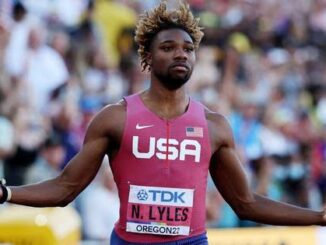
Faith Kipyegon publicly challenged: “I will pay for the SRY test for suspected athletes like Sal and Indi, as long as the results are published.” Immediately after that, Sha’Carri Richardson fiercely accused her of being “intersex-phobic,” but Faith Kipyegon responded with a shocking action to the entire women’s athletics community: “This is protecting women!”
In a move that has ignited fierce controversy across the global athletics community, Kenyan middle-distance running icon Faith Kipyegon publicly challenged the eligibility of two rising athletes, only referred to as Sal and Indi, offering to fund their SRY gene tests to determine whether they carry the Y chromosome typically associated with male biological sex. “I will pay for the SRY test for suspected athletes like Sal and Indi, as long as the results are published,” Kipyegon declared in a bold statement that many saw as a direct confrontation against what she views as a growing threat to fairness in women’s sport.
The SRY gene test, often used to determine sex development disorders, has become a lightning rod in the debate surrounding intersex and transgender athletes in elite sports. Kipyegon’s call for public test results has been praised by some as a stand for competitive integrity, while others see it as invasive and discriminatory.
One of the fiercest responses came from U.S. sprint star Sha’Carri Richardson, who accused Kipyegon of being “intersex-phobic” and perpetuating harmful narratives against athletes whose gender identities or biology differ from typical definitions. Richardson posted on social media: “This is not ‘protecting women.’ This is targeting women who don’t fit your standard of what a woman should look like. We are not your enemy.”
However, Kipyegon, a two-time Olympic gold medalist and world record holder, was not deterred by the backlash. In a move that stunned both critics and supporters, she responded not with further words, but with action: she organized a closed-door meeting with a coalition of elite female middle- and long-distance runners. Emerging from that meeting, she stood beside several fellow athletes—including some former world champions—and issued a joint statement titled “This Is Protecting Women.”
The statement called for increased transparency from international athletics governing bodies regarding sex classification in elite women’s events. It emphasized the importance of protecting the female category, particularly in events where biological advantages—such as testosterone levels, muscle mass, and bone density—can decisively impact performance.o
“We are not attacking individuals,” the statement read. “We are protecting the meaning and purpose of the women’s category in sport. Women’s athletics is not a catch-all category for anyone who isn’t male. It is a protected class, and we must ensure that fairness remains the foundation.”
The fallout has been immediate. Social media is sharply divided. Some athletes, including several Eastern European and African runners, have expressed support for Kipyegon’s stand, while others—including prominent LGBTQ+ advocates—have condemned her comments as regressive.
World Athletics has yet to comment directly on Kipyegon’s challenge or the controversy that followed. But sources indicate that internal discussions around eligibility policies may accelerate due to the public pressure.
What’s clear is that Faith Kipyegon has ignited a firestorm that may reshape the boundaries of women’s sports—perhaps for years to come.



Be the first to comment